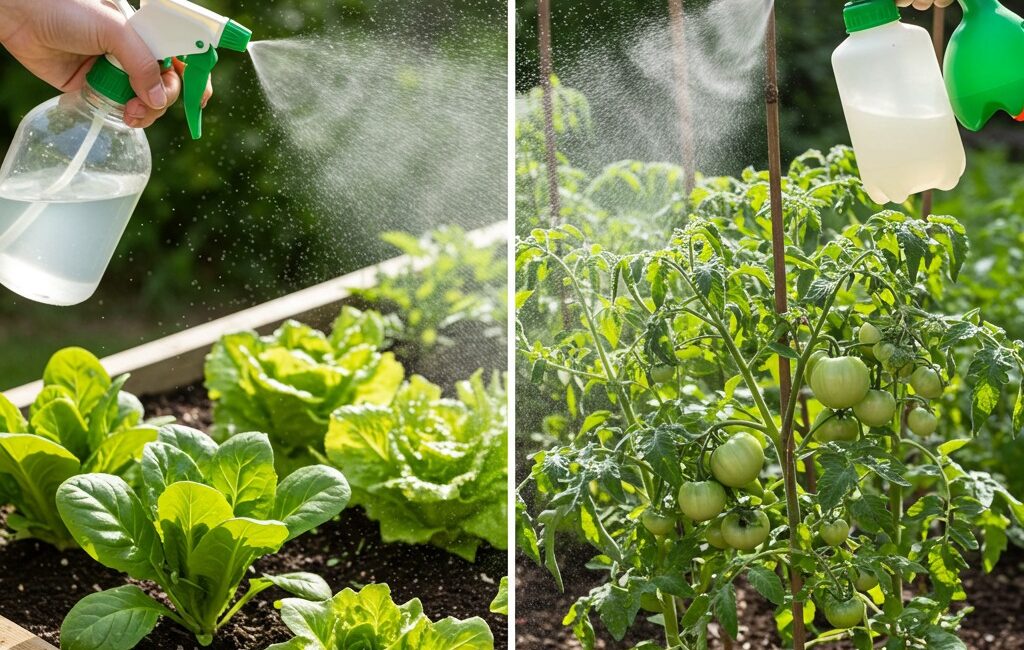Vinegar is undoubtedly a kitchen and household essential—valued for its versatility in cooking, cleaning, and preservation. However, many gardeners are pleasantly surprised to discover that vinegar’s benefits extend far beyond culinary and domestic applications. When it comes to gardening, vinegar is an inexpensive, eco-friendly, and powerful ally that can help you maintain healthier plants, deter pests, combat weeds, and even enhance the vibrancy of your blooms.
In this comprehensive guide, we will delve into seven practical and clever uses of vinegar on plants, exploring why vinegar works so well and how to apply it safely and effectively. Whether you’re a seasoned horticulturist or an enthusiastic beginner, understanding how to incorporate vinegar into your gardening routine can revolutionize your approach to plant care and garden maintenance.
Understanding Vinegar: Composition and Gardening Relevance
Before diving into specific applications, it’s important to understand what makes vinegar so effective in the garden. Vinegar is a solution of acetic acid and water, with the concentration of acetic acid varying typically between 4% to 8% in household vinegar, and up to 20% or more in horticultural or industrial vinegar.
- Acetic Acid: The main active component responsible for vinegar’s antimicrobial, herbicidal, and pH-altering properties.
- pH Alteration: Vinegar’s acidity lowers soil and surface pH, creating conditions that inhibit certain pests, fungi, and weeds.
- Non-Toxic & Biodegradable: Unlike harsh chemical pesticides or herbicides, vinegar breaks down naturally without leaving harmful residues.
Now, let’s explore the specific gardening scenarios where vinegar shines.
1. Natural Ant Repellent: Apple Cider Vinegar to the Rescue
Ant infestations around your plants can be more than a nuisance—they often protect aphids and other pests that harm plants by farming them for honeydew. Apple cider vinegar (ACV) is particularly effective for deterring ants due to its acidic nature and aromatic compounds.
How to Use:
- Mix equal parts apple cider vinegar and water in a spray bottle.
- Spray the solution around the base of plants, on the soil, and on ant trails.
- Repeat every few days until ants disappear.
Why It Works:
The acetic acid in ACV disrupts the scent trails ants use for navigation, confusing and deterring them without killing beneficial insects. Unlike chemical pesticides, vinegar is safer for the environment and your plants, making it ideal for organic gardening.
2. Combatting Fungal Infections: Acidify to Protect
Fungal diseases such as powdery mildew and root rot thrive in neutral to alkaline soils. Because vinegar lowers soil pH, it creates a less hospitable environment for these pathogens.
Application:
- Mix 1 tablespoon of vinegar per liter of water.
- Spray on soil and affected plant leaves twice weekly.
- Avoid excessive application to prevent damage to beneficial soil microbes.
Benefits:
Regular use helps reduce fungal spore germination, improving plant health and boosting resistance to infections. This method is especially useful for potted plants and garden beds prone to fungal outbreaks.
3. Encouraging Blooming in Acid-Loving Plants: Azaleas, Gardenias, Hydrangeas
Certain ornamental plants flourish in acidic soil conditions. Vinegar offers an accessible way to adjust soil pH without expensive commercial acidifiers.
Recipe:
- Mix 250 ml of white vinegar with 5 liters of water.
- Water your acid-loving plants monthly with this solution.
Cautions:
Overuse can overly acidify soil and harm plants, so limit applications to once a month, allowing the soil pH to stabilize.
Outcome:
Enhanced nutrient absorption promotes lush foliage and vibrant blooms, making vinegar an effective tool for gardeners cultivating hydrangeas, azaleas, and gardenias.
4. Efficient, Eco-Friendly Herbicide: Say Goodbye to Weeds
Weeds compete with your plants for nutrients, sunlight, and water. Vinegar’s strong acidity makes it a potent natural herbicide that can eliminate unwanted vegetation without toxic chemicals.
Instructions:
- Use undiluted white vinegar for best results.
- Spray directly on weeds during sunny, dry weather.
- Expect visible wilting within a few hours; repeat applications may be necessary.
Advantages:
Unlike synthetic herbicides that can linger and damage soil health, vinegar degrades quickly, ensuring a safer garden ecosystem. This is particularly useful for organic growers and environmentally conscious gardeners.
5. Deter Cats and Other Curious Garden Intruders
Cats may cause damage by digging in pots, trampling delicate plants, or using garden beds as litter boxes. Vinegar’s strong smell is an effective deterrent.
How to Use:
- Lightly sprinkle vinegar around vulnerable plants.
- Refresh the application regularly, especially after rain.
Benefits:
This natural deterrent keeps your garden intact without harming animals, maintaining peace between your plants and neighborhood pets.
Click page 2 for more




